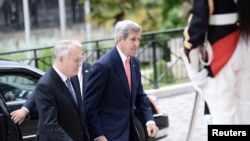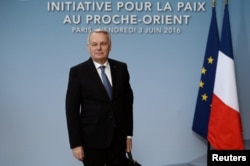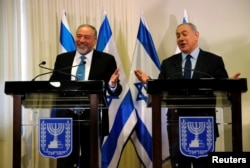U.S. Secretary of State John Kerry said Friday that both Israel and the Palestinians needed to take immediate steps to demonstrate the will to seek lasting peace.
“We need to find some immediate kinds of steps on the ground that will make a difference,“ Kerry told reporters in Paris. “Everybody agreed today that you can’t impose a solution from outside and you need to have direct negotiations."
Ministers from more than 20 countries who gathered in Paris welcomed France’s offer to coordinate efforts to convene an international conference by year's end. Neither Israel nor the Palestinians attended.
"A negotiated two-state solution is the only way to achieve an enduring peace, with two states, Israel and Palestine, living side by side in peace and security," conference participants said in a joint communique after their meeting.
Participants underscored that the status quo was not sustainable. "Actions on the ground, in particular continued acts of violence and ongoing settlement activity, are dangerously imperiling the prospects for a two-state solution," the communique said.
Participants discussed possible ways in which the international community could help advance the prospects for peace, including by providing meaningful incentives to the parties to make peace and end the Israeli occupation that began in 1967.
Hollande approach
French President Francois Hollande called on Israel and the Palestinians to "make the courageous choice of peace" as he opened Friday's conference.
"The discussion on the conditions of a lasting agreement between Israelis and Palestinians must take into account the whole of the region," he said.
Hollande said international powers should play a key role in facilitating the peace process, but that ultimately it would be up to the two sides to work out their differences.
"The threats and priorities have changed. The changes make it even more urgent to find a solution to the conflict, and this regional upheaval creates new obligations for peace," he said.
Washington's response to the French effort has been tepid, with Kerry agreeing to attend simply to listen to ideas proposed by France and others. Still, senior U.S. officials stressed the sense of urgency about working toward a negotiated two-state solution.
"We're not here to propose any kind of specific agenda," a senior State Department official said. "While the U.S. is open-minded about ideas, we haven't made any decisions about what, if any, our role would be in that initiative going forward."
Despite the recent escalation in violence between Israelis and Palestinians and their absence at the conference, the swearing in Monday of ultranationalist Israeli Defense Minister Avigdor Lieberman, who said he supported a two-state solution, has provided a glimmer of hope.
After a meeting that included U.N. Secretary-General Ban Ki-moon on Friday, Kerry told reporters he would possibly be open to holding an international conference later this year with Israeli and Palestinian representatives in attendance, but he cautioned that the talks were just getting started and that such a meeting was far from set in stone.
"We'll see. We'll have that conversation. We have to know where it's going, what's happening. We're just starting — let's get into the conversations," he said while shuffling between meetings.
Poor prospects
Experts caution that the chances of a genuinely open-minded discussion are dim.
"I think June 3rd could produce something in terms of moving the process forward," regional expert Natan Sachs of the Brookings Institution told VOA. "There's a lot of will, especially among the powers — the U.S. and now France — to get something going. They might get Israel to acquiesce somewhat to this kind of idea, but [the likelihood of] a major breakthrough, a major movement in the peace process — that remains quite low."
Sachs noted that the Israelis rejected the idea of an international conference because it was viewed as one that was intent on imposing a solution upon them.
The French-led peace initiative included ministers and delegates from the so-called Middle East Quartet (the United States, Russia, the European Union and the United Nations) and the Arab League.
Isabela Cocoli and Josh Fatzick in Washington contributed to this report.















